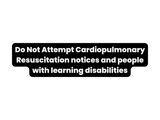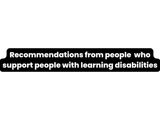Anthony discussed the challenges in making complaints as a service provider and the role of GPs in decision-making. He also noted that it is unacceptable that such important legal decisions can be left off of System One (the most widely used database system in the NHS).
Lived Experience Research
Do Not Resuscitate Notices & People with Learning Disabilities
The Parliamentary and Health Service Ombudsman (PHSO)
commissioned BIHR to research how the DNACPR process is viewed by people with learning disabilities and produce a set of recommendations setting out what changes they would like to see.
What are DNACPRs?
A Do Not Attempt Cardiopulmonary Resuscitation notice (commonly abbreviated to DNACPR) is a notice placed on a patient’s file saying that if their heart or breathing stops, doctors will not try to restart it.
While it is ultimately up to doctors to decide whether to put a DNACPR on a patient's file, decisions must be made with respect for people's human rights.
What human rights are involved?
DNACPR decision-making may engage a range of people's legally protected human rights, in particular (though not limited to):
What was BIHR's research about?
Because of the complaints it received and research it has already carried out, PHSO realised it's important to the number of complaints received and its subsequent research, has recognises that it is important to look further at the experience of people with learning disabilities on the processes and use of do not attempt cardiopulmonary resuscitation (DNACPR).
Our research project was commissioned specifically to ensure that the experiences and recommendations of people with learning disabilities have a key space in this report.
Watch the videos
This report is also available as a series of videos, which you can watch below.
1. The need for accessible information
There is an urgent need for healthcare professionals, services, and systems, to provide people with learning disabilities, and their supporters, with accessible information (in variety of formats) on the decision-making process, and to do this automatically, rather than requiring people to request it.
2. Person-centred decision-making
Whilst the law requires this, the everyday practice must be that people with learning disabilities are at the centre of decision-making on DNACPRs. If they have been assessed as lacking mental capacity to make this decision for themselves, their wishes and feelings must still be central, and their loved ones or supporters should also be involved in decision-making.
3. The right to freedom from discrimination
A person’s learning disabilities should never be the reason for a DNACPR being issued, this is discriminatory.
4. The right to challenge
Healthcare professionals, services, and systems where DNACPR decisions are made must make it clear that people with learning disabilities and their supporters, can question, challenge, and complain about DNACPRs. The processes to enable this must be supportive and accessible, and external accountability bodies hold decision-makers accountable for unlawful DNACPR practices.
BIHR's CEO, Sanchita Hosali, said of the report:
"Today’s report is directly driven by the experiences of people with learning disabilities, their loved ones and supporters. People have shared powerful stories of their experiences, and their fears should they ever need resuscitation. We should all stop, listen and take action on the recommendations, to ensure people with learning disabilities have equal respect for their human rights in healthcare, particularly when critical decisions like DNACPR are being made."
To support BIHR's research, Becky and Sarah from Warrington Speak Up also created a video sharing their thoughts on DNACPRs and the impact on people with learning disabilities.
They said, "it is a sensitive and emotional subject that needs to be discussed openly. These honest conversations are important to us; we should always be involved in any conversation about our lives and should have our voices heard. We all have a right to make decisions about ourselves."
The Parliamentary Health Service Ombudsman (PHSO's) full report, "End of life care: improving ‘do not attempt CPR’ conversations for everyone" is now available on the PHSO website.
The report reflects BIHR's findings that there is a lack of accessible information and that people are not told as a matter of course (as is legally required) that a DNACPR decision has been made. It recommends that all doctors and nurses undergo scenario-based training and that accessible materials are made available. It also says that regulators should update their guidance and that record keeping is improved.
The report also draws on research into the experiences of older people undertaken by the organisation Compassion in Dying.
Related information
Stay up-to-date
Get our newsletter
Get monthly updates on UK human rights law and our work, resources and events sent straight to your inbox.









